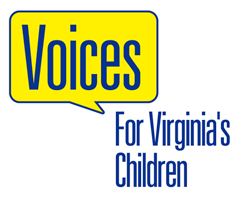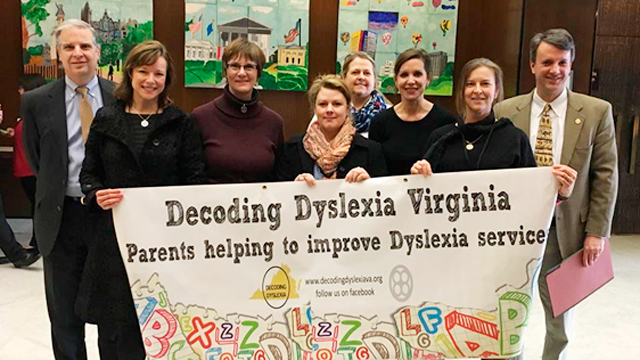Now that the kids are back in school and we’ve all settled into our fall routines, we might think the hard part is over. But for many students, the beginning of school is a time of new, and sometimes overwhelming, challenges. Whether those obstacles to school success are due to poverty, mental health problems, or learning disabilities, this is the time of year when those difficulties can become most apparent.
Dyslexia is one of the most common learning disabilities children face, but many people – including school staff – do not fully understand the nature of this language-based learning disability, or what kids need to overcome it. That’s where parent advocate Jenna Hynes comes in. As the Henrico leader for Decoding Dyslexia Virginia, board member of the Virginia Branch of the International Dyslexia Association (VBIDA), and a member of Henrico’s Special Education Advisory Committee, Jenna is uniquely positioned to raise her voice on behalf of students with dyslexia and other challenges for children, often referred to as hidden disabilities.
She and other advocates for Decoding Dyslexia Virginia successfully argued for HB842, legislation that passed in the 2016 General Assembly session requiring two hours of teacher training for dyslexia and other hidden learning disabilities beginning July 1, 2017. While it is a modest first step, it is an important accomplishment.
“I find it rewarding,” Jenna said, of the advocacy in the General Assembly. She has discovered that legislators are very receptive, and she has become adept at sharing her story succinctly, as even the most interested lawmakers are often strapped for time.
An important part of her effort is providing education about the disability. Dyslexia occurs on a spectrum, with some individuals more impaired than others, but it has nothing to do with underlying intelligence. It is a neurological difference that affects how people process language and can have a huge effect on a child’s ability to learn to read. According to Jenna, the sound-it-out method most often taught in public schools does not work for students with dyslexia.
What does work is a model of teaching called structured literacy that incorporates a number of logical steps to help children decode language in ways that their brains can process. Unfortunately, many teachers do not know how to implement the evidence-based models of structured literacy – particularly at the intensity and duration required to see results. This newly legislated two hours of mandatory teacher training will be an introduction.
As many as 70 to 80 percent of the students who are in special education services for a learning disability have difficulties related to reading. That’s why this kind of progress on training educators to effectively work with these children could have a huge impact on academic achievement. Proficiency in reading at the third grade level is an indicator of future school success. According to the International Dyslexia Association, 74 percent of students who are poor readers in third grade continue to be poor readers in ninth grade, when the stakes are much higher.
Kids with dyslexia frequently experience simultaneous learning challenges, including dysgraphia (difficulty writing), dyscalculia (difficulty with math), auditory processing issues, ADHD, and sensory processing disorders. If a correct diagnosis is not made, students can sometimes be labeled as not smart or not willing to put forth the effort to succeed in school. These labels can be incredibly frustrating for children and lead to anxiety or depression around
school attendance.
Fortunately, there are parent support groups and online resources for families working to understand their kids’ unique learning needs. Also, at least one organization is working to promote the positive aspects of dyslexia. Because people with dyslexia process certain types of information differently, they may be more likely to be successful in certain creative and entrepreneurial endeavors. (See below for resources.)
While Jenna and her fellow parent advocates are excited that progress has been made at the General Assembly, their work is far from finished. Last month, Jenna presented on behalf of VBIDA and Decoding Dyslexia to Virginia’s legislative Commission on Youth, and will continue to advocate for additional requirements around structured literacy training in Virginia schools.
As a child advocate, I’m encouraged to see fellow advocates making such a difference. The legislator who sponsored HB842, Delegate Ben Cline of Rockbridge County, acknowledges the parents’ key role. “The grassroots advocacy from the dyslexia community made all the difference for the bill’s success. When obstacles arose, the only reason we were able to overcome them was because the committee members had been educated about the issue by their constituents. The legislation mattered to delegates and senators because the legislation mattered to their friends and neighbors back home,” Cline said. “With tenacity and dedication, these concerned parents became passionate advocates and were ultimately successful in passing meaningful legislation.”
Important Dyslexia Resources
Decoding Dyslexia Virginia Facebook page: facebook.com/DecodingDyslexiaVirginia/
Virginia Branch of the International Dyslexia Association: vbida.org
Virginia Parent Educational Advocacy Training Center: peatc.org
Understood, for learning and attention issues: understood.org
Dyslexic Advantage, promoting attributes of those with dyslexia: dyslexicadvantage.org
Accessible Instructional Materials: aimva.org
To join the parent advocate team, email Jenna at hynesjenna@gmail.com.





